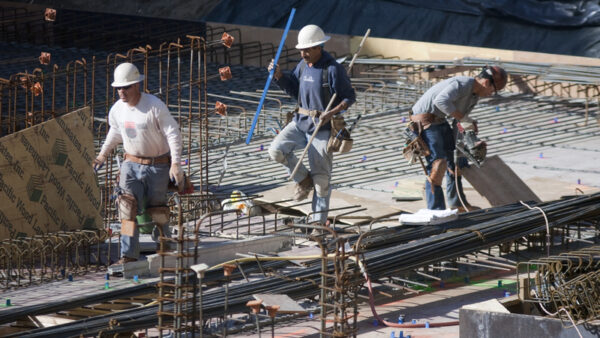“Shambles”, “lack of clear leadership”, “limbo”, and “hanging in the balance” were some of the concerns expressed by UK construction industry players this morning as the nation woke up to the shock results of yesterday’s election.
Uncertainty is the only thing we are sure of– Phoebe Rowntree, British Property Federation
After losing her costly gamble on a Conservative Party landslide Prime Minister Theresa May (pictured) has been forced to seek a coalition with the 10-seat Democratic Unionist Party of Northern Ireland, relinquishing hopes for a strong mandate to negotiate Brexit and her Conservative policies.
The resulting uncertainty has drawn a strong reaction from the construction and property sector, which was hoping for politics to settle down as the UK heads into an unknown, post-EU future.
Phoebe Rowntree, communications manager for the British Property Federation, summed up the view among the industry’s private sector clients. She said: “Investors hate uncertainty. It has been the chorus of the real estate industry time and again over the past few years, when faced by policy upheavals from stamp duty land tax increases to Brexit. And yet once again after last night’s shock election result, uncertainty is the only thing we are sure of.”
The National Federation of Builders (NFB) urged all parties to work cooperatively and get on with the job of “fixing broken housing policies, reforming public procurement, fostering home-grown talent, and enabling SME builders to grow and flourish”.
Richard Beresford, chief executive of the NFB, said: “Now more than ever, political parties must set ideological differences aside and put country before party. Any new government will need to focus on putting SME builders into a better place to build the homes and train the skilled workers the UK needs to succeed, as well as allowing regional economies to prosper.”
Steve Turner, the head of communication at the House Builders Federation, said it was too early to make any comments on how the result would affect the UK’s private housebuilding industry, but he said the HBF was optimistic that both main parties would back an expansion in output. He said: “If the Conservatives come out on top we expect they’ll put their February white paper into effect, and Labour have backed the Help to Buy scheme, so that’s a positive as well.”
Kevin Cammack, analyst at City stockbroker Cenkos Securities, worried about major projects.
“From a market perspective it isn’t particularly helpful,” he told GCR. “Minority governments are never generally favourable periods for investment markets because of the unpredictability of policy. I think there is a chance given the circumstances surrounding this that the Tories may be less inclined to pursue some of the major projects like HS2 with the vigour that they have been and areas like local authority outsourcing will be put on hold.
“There was a general acceptance six months ago that the infrastructure spend was only going one way and if you look at a lot of the forecasts, they were expecting aggressive growth. I wouldn’t be surprised if that stalls or slows and the government will be looking at diverting some of the capital spend that we may have identified to health and education and other social programmes in preparation for the next election.”
Also worried is the Civil Engineering Contractors Association (CECA). Its director of external affairs Marie-Claude Hemming said: “With the shape of any future government hanging in the balance, we worry that this may create further delays to vital decisions that were put on hold due to the election.
“Our most recent member survey showed orders dropping for infrastructure contractors for the first quarter since 2013. A lack of clear leadership in Westminster creates a real risk that this potential future downturn will become entrenched due to an inability to get vital decisions over the line.
“We hope that there will be an early resolution to the current uncertainty over the shape of any new Government, allowing decisions on projects such as HS2 to be made and work to get underway on building the infrastructure that the UK needs.”
The sentiments were seconded by the Institute of Directors, which tends to speak for the SMEs that make up most of the country’s 240,000 construction firms. Stephen Martin, the institute’s director general, said “Businesses have shown in the last year that they are resilient to surprise results, but they have now been thrown into political limbo”.
Head of infrastructure at Pinsent Masons, Richard Laudy, said: “Whatever the wider political ramifications of a hung parliament might be, this looks like a bad result for the UK’s infrastructure as we head into another period of political uncertainty.
“The UK desperately needs to attract investors if it is to improve its ailing infrastructure yet the political uncertainty in which we now find ourselves is precisely what puts off investors and will make our infrastructure problems more difficult to solve.
“There must also now be a real fear that the Government will be distracted away from addressing questions such as the UK’s skill shortage as it seeks to shore up its own position. The UK needs an additional 36,000 workers every year to meet the current demand for infrastructure and the Government needs to address this. The problem is immediate and acute and will not be solved by reskilling or apprenticeships alone. There needs to be an open conversation between Government and industry, recognising the need to collaborate, map the skills required to deliver our infrastructure and provide for this within any post-Brexit immigration system.
“It is imperative for the future of Britain’s infrastructure that the Government faces up to the challenges around funding and skills and does not allow infrastructure to slip further down its list of priorities as it seeks to grapple with its own position.”
Mark Robinson, chief executive of Scape Group, a public sector procurement organisation, was even more forthright.
“This result is a real shambles for both the country and our industry,” he said. “We needed a party to secure a clear majority and a mandate to implement a fiscal strategy which would support the construction industry over the next five years. Instead, even though the votes have been counted, we are no closer to knowing who the government will be and, vitally, how long it will last.
“The one glimmer of good news is that there is cross party support for investment and growth in core public areas such as education, health and housing. While the parties might disagree on the exact delivery methods, we should see some certainty and stability there no matter the Government.
“However, the delivery of flagship, major infrastructure projects such as HS2 and Heathrow expansion will now, unfortunately, be open to doubt and debate. The Industrial Strategy is now more important than ever. We need security and clarity on infrastructural investment across the country, as this is the backbone to continued economic growth and prosperity.”
On a positive note, Nicola Gooch, senior associate, at solicitor Irwin Mitchell, saw in the split election result a boost for social housing.
“All three parties have also promised to boost provision of social housing – although their plans for doing so vary dramatically,” she said.
“The Lib Dems focus on removing the right to buy and lifting the borrowing cap for local authorities and housing associations. Labour promises the largest state house-building initiative in 30 years and the Conservatives focus on providing a new form of housing tenure and new funding proposals to boost social housing supplies.”
Eddie Tuttle, Associate Director for Policy, Research and Public Affairs at the CIOB, said: “Whatever form the new government takes, the CIOB and its members are keen to engage with them to raise awareness of and address the issues currently facing the construction industry and built environment.Â
“Uncertainty that a hung parliament brings is not helpful to the industry, and we therefore hope a swift resolution will be found. Construction both benefits from economic growth and drives future growth, so there is a pressing need for stable investment, particularly on a regional level.Â
“We know from the main political parties’ manifestos that there is general cross-party consensus on key investment and growth decisions related to construction, including housing, infrastructure, education and health. We must now see that put into action.
“The need for an Industrial Strategy that recognises construction as a key enabler is now more important than ever to create a high-productivity economy
Image: Prime Minister Theresa May at her constituency on 9 June 2017 after her party’s shock election upset (Matt Cardy/Getty Images)






